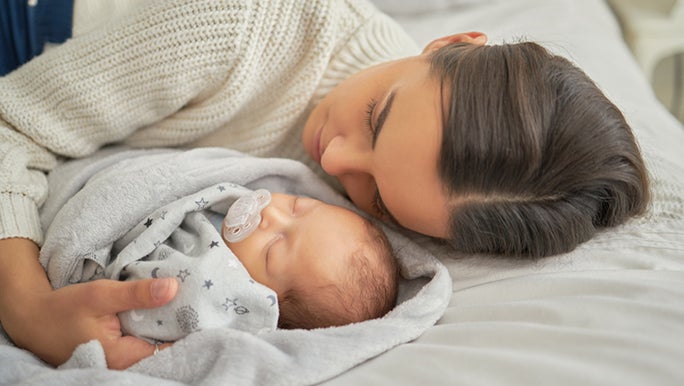Key Points
- One in six Australian couples experience fertility-related challenges – and this can be stressful
- Telltale signs of stress to look out for
- Ways to reduce stress in pregnancy and beyond
Nurturing your mental health is important at every stage of life. But prioritising yourself during the lead-up to conception, followed by pregnancy and the fourth trimester, can be especially challenging – but important to prioritise.
Because this is easier said than done, we spoke to Registered Health Psychologist and healthylife Advisory Board member Dr Moira Junge about managing stress in pregnancy, during challenging fertility journeys and throughout the postpartum blur.
Nurturing mental health when trying to conceive
For some, trying to conceive is a joyful and magical time full of romance and excitement; reading up on health recommendations, researching exercises to help support conception and, of course, the baby-making itself!
But things don’t always go smoothly: one in six Australian couples experience fertility-related challenges – and this can be stressful.
Adding to that stress, “fertility journeys can also come with an unexpected diagnosis of conditions like endometriosis, polycystic ovaries or low sperm count,” says Dr Moira.
Even after conception, fetal complications and miscarriages can happen – about one in five women who know they are pregnant have a miscarriage in the first 20 weeks of pregnancy. This is why it’s so important to be aware of the impact of the fertility journey on mental health.
The relationship between stress and infertility
A 2018 study found that although women with infertility report feelings of anxiety and depression, it’s not clear whether stress causes infertility. Always visit your GP if you’re struggling with your mental or emotional health.
Interestingly, the study found that professional therapy for women experiencing infertility – for example, cognitive behavioural therapy – has the potential to decrease mild anxiety and low mood and may lead to higher pregnancy rates. Mindfulness practices and relaxation techniques were also found to help.
Dr Moira agrees that, “although the research isn’t that clear, trying to reduce your stress at any time in life is really always a good idea”.
And because we want to make fostering a positive mindset just as easy as following a good fertility diet, let’s look at the ‘how’.
Mindset shifts for when it’s taking a long time to conceive
Although a positive mindset isn’t always that simple to achieve, Dr Moira recommends you:
- try to take it day by day
- resist the temptation to ask Dr Google
- take your guidance from one or two trusted sources, like a GP or obstetrician
- try to maintain optimism
- set realistic timeframes

Trying to reduce your stress at any time in life is always a good idea, but it’s even more important when you’re on the fertility journey or pregnant
Stress in pregnancy: how much is too much?
Pregnancy can be a roller-coaster of emotions: along with joy, there can also be fear, exhaustion and stress.
Although these mood changes may be overwhelming, they can be a normal part of the journey.
But while a little bit of stress may be manageable, it’s important to be aware of how much stress is too much when pregnant. Dr Moira says to ask yourself how much it’s affecting your quality of life.
“When you don’t feel like you’re managing for a sustained period of time – a few weeks or more – that’s when you should consider reaching out for help,” she says.

Emotional support for pregnant mothers can help a lot during this special time, so make an effort to reach out and connect with others
Physical and behavioural signs you’re stressed
Although it is normal to be stressed and sad sometimes when pregnant, there are telltale signs of stress you should look out for – just like we learn to recognise our signs of ovulation when we’re trying to conceive. They are all important signposts to let us know what’s going on.
Dr Moira suggests you pay attention to:
- changes in sleep patterns
- changes in appetite
- irritability
- anger
- feelings of overwhelm
- muscle tension
- headaches
- difficulty concentrating
- reliance on ‘sometimes’ food or other substances to cope
How to reduce stress in pregnancy
Unfortunately, it may not always be easy to find accessible emotional support for pregnant mothers, so it’s important to be proactive in asking for help.
“Try to find a balance between being superwoman and wrapping yourself in cotton wool,” Dr Moira suggests. “And make sure to try to reset at the end of each day.”
When it’s all feeling a little too overwhelming, consider:
- seeking support
- socialising
- outsourcing chores like cleaning
- taking a holiday
- embracing mindfulness
- asking for help before things get too dire

It’s important to nurture mental health during the postpartum period when sleep deprivation and overwhelm are common
Postpartum mental health
As beautiful as the newborn baby bubble can be, challenges may arise during the postpartum stage. Sleep deprivation, mild postnatal anxiety and financial stress are just some of the challenges new parents may face.
Ways to look after your mental health during this period
Dr Moira advises that you seek really good support during this time, either through paid professionals or through reaching out to people in your community.
But most importantly, try to prioritise sleep. “Don’t worry about the housework or catching up on social media – just rest when you can,” she says.
If you need more help or support with mental health, please see your GP. You can also visit Beyond Blue for additional resources.
Related:
Dr Moira Junge is a registered practising health psychologist, with the added specialty of sleep. She is a member of the healthylife Advisory Board, is the current CEO of the Sleep Health Foundation and was a founding member of the Behavioural Management of Sleep Disorders Committee within the Australasian Sleep Association (ASA). She was also the Chair of the ASA Insomnia and Sleep Health Council (2008-2015). For over 10 years, Moira was a registered nurse. She has been a psychologist for over 20 years.
Reviewed by the healthylife Advisory Board December 2022.



